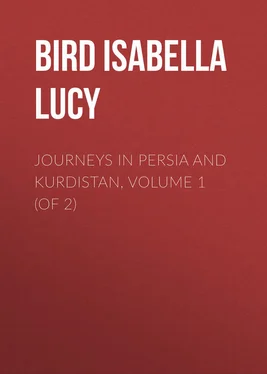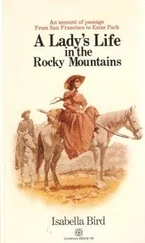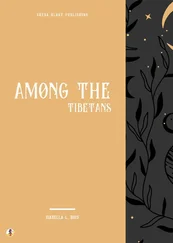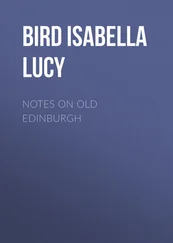Isabella Bird - Journeys in Persia and Kurdistan, Volume 1 (of 2)
Здесь есть возможность читать онлайн «Isabella Bird - Journeys in Persia and Kurdistan, Volume 1 (of 2)» — ознакомительный отрывок электронной книги совершенно бесплатно, а после прочтения отрывка купить полную версию. В некоторых случаях можно слушать аудио, скачать через торрент в формате fb2 и присутствует краткое содержание. ISBN: , Жанр: foreign_language, foreign_antique, foreign_prose, Путешествия и география, на английском языке. Описание произведения, (предисловие) а так же отзывы посетителей доступны на портале библиотеки ЛибКат.
- Название:Journeys in Persia and Kurdistan, Volume 1 (of 2)
- Автор:
- Жанр:
- Год:неизвестен
- ISBN:http://www.gutenberg.org/ebooks/38827
- Рейтинг книги:4 / 5. Голосов: 1
-
Избранное:Добавить в избранное
- Отзывы:
-
Ваша оценка:
- 80
- 1
- 2
- 3
- 4
- 5
Journeys in Persia and Kurdistan, Volume 1 (of 2): краткое содержание, описание и аннотация
Предлагаем к чтению аннотацию, описание, краткое содержание или предисловие (зависит от того, что написал сам автор книги «Journeys in Persia and Kurdistan, Volume 1 (of 2)»). Если вы не нашли необходимую информацию о книге — напишите в комментариях, мы постараемся отыскать её.
Journeys in Persia and Kurdistan, Volume 1 (of 2) — читать онлайн ознакомительный отрывок
Ниже представлен текст книги, разбитый по страницам. Система сохранения места последней прочитанной страницы, позволяет с удобством читать онлайн бесплатно книгу «Journeys in Persia and Kurdistan, Volume 1 (of 2)», без необходимости каждый раз заново искать на чём Вы остановились. Поставьте закладку, и сможете в любой момент перейти на страницу, на которой закончили чтение.
Интервал:
Закладка:
It was beautiful, that uplifted, silent world of snow and mountains, on whose skirts for some miles grew small apple and pear trees, oak, ash, and hawthorn, each twig a coral spray. In the deepest depression, among great rocks, now masses of snow, tumbles a now partially arrested stream, gleaming with icicles, one of the head-waters of the Holwan. After getting through this picturesque forest of scrub, the road emerges on the plateau of the Kirrind valley, the greatest altitude of which is about 5800 feet. It is said to be irrigated and fertile. It is now, as I describe it, a wide valley, without a tree or bush, a rolling plain of snow from two to three feet deep, marked only by lines made by birds' feet and the beating of the tips of birds' wings, the track across it a corrugated trench, wide enough for one mule, the sun brilliant, the sky blue, the surface of the snow flashing light from millions of crystals with a glitter not to be borne, all dazzling, "glistering," silent, – a white world and a blue heaven, with a sun "shining in his strength," – light without heat.
It has been a tremendous day's march, only fourteen miles in seven and a half hours of severe toil! The katirgis asked us to keep together in case of difficulties with caravans. Difficulties indeed! A mild term! I was nearly smashed. I little knew what meeting a caravan in these circumstances meant till we met the first sixty animals, each laden with two heavy packing-cases. The question arises who is to give way, and who is to drive his heavily-laden beasts off the track, to struggle, flounder, and fall in three feet of snow, not to get up again without being unloaded, and even then with difficulty.
The rub came on a bank near a stream where there was a deep drift. I decided to give way, but nothing would induce my mule to face the snow. An orderly was in front and Hadji behind. Down the track came sixty animals, loaded with their great packing-cases. They could not and would not give way, and the two caravans came into collision. There were mules struggling and falling, loads overturned, muleteers yelling and roaring, Hadji groaning "God help us!" my mule, a new one, a big strong animal, unused to a bit, plunging and kicking, in the middle of a "free fight." I was struck hard on my ankle by a packing-case and nearly knocked off. Still, down they came, in apparently endless hordes; my mule plunged her bridle off, and kicked most violently; there were yells all round. My snow spectacles were knocked off and lost, then came another smash, in which I thought a bone was broken. Fearing that I should be laid up with a broken limb for weeks in some horrible caravanserai, and really desperate with the danger and confusion, I called over and over again to Hadji to get off and pull my mule into the snow or I should be killed! He did not stir, but sat dazed on his pack moaning "God help us!" till he, the mule, and the load were rolled over in the drift. The orderly contrived to get the bridle on my mule, and to back his own in front of me, and as each irrepressible animal rolled down the bank he gave its load a push, which, nicely balanced as these loads are, made it swerve, and saved me from further damage. Hadji had rolled off four times previously, and the last I saw of him at that time and of the caravan was a man, five mules, and their loads buried in the snow. The personal results to me of what is euphemistically called a "difficulty," are my blue glasses gone, a number of bruises, a badly-torn riding-skirt, and a bad cut, which bled profusely, and then the blood froze.
A number of caravans snowed up for several days were en route , and there were many similar encounters, and donkeys and mules falling with their loads and rolling into the deep snow, and katirgis coming to blows over the right-of-way. If a donkey is forced off the track it goes down at once. I unfortunately caught my foot in the pack of one and rolled it over, and as it disappeared in the snow its pack and saddle fell over its head and displayed the naked vertebræ of its poor back.
This Kirrind valley must be fully twenty miles long by from two to five broad, but there was only one village inhabited and two in ruins. As we floundered along in the snow with our jaded animals, two well-armed men on fine horses met and joined us, sent by the Agha Abdul Rahim, son of the British agent at Kirmanshah, whose guests we are to be. Following them was a taktrawan or litter for me, a wooden box with two side doors, four feet high, six feet long, and three feet wide. At each end are long shafts, and between each pair of shafts a superb mule, and each mule has a man to lead him. I could never use such a thing except in case of a broken limb, but I am very grateful to Abdul Rahim for sending it fifty-six miles.
The temperature fell with the sun; the snowy hills took on every shade of rose and pink, and in a universal blush of tender colouring we reached Kirrind. All of a sudden the colour died out, the rose-flushed sky changed to blue-gray, and pallid wastes of unbroken snow stretching into the gray distance made a glorious winter landscape. We are now fairly in for the rigours of a Persian winter.
Kirrind, the capital of the Kirrind Kurds, is either grotesquely or picturesquely situated in and around a narrow gap in a range of lofty hills, through which the Ab-i-Kirrind rushes, after rising in a spring immediately behind. The gap suggests the word jaws, and in these open jaws rise one above another flat-roofed houses straggling down upon the plain among vineyards, poplars, willows, fruit-trees, and immense walnuts and gardens. There are said to be 900 houses, but many of them are ruinous. The stream which bursts from the hills is divided into innumerable streamlets, which must clothe these gardens with beauty.
A farāsh riding on ahead had engaged a house, so we avoided the horrors of the immense caravanserai, crammed to-night with storm-bound caravans. The house is rough, but has three adjoining rooms, and the servants are comfortable. A fire, with its usual accompaniment of stinging smoke, fails to raise the temperature of my room to the freezing-point, yet it is quite possible to be comfortable and employ oneself.
Mahidasht, Jan. 24. – My room at Kirrind was very cold. The ink froze. The mercury fell to 2° below zero in it, and outside in the sun was only 14° at 8.30. There was a great Babel at starting. Some men had sold four chickens for the high price of 2s. each, the current price being 6d., and had robbed the servants of two, and they took one of the mules, which was sent after us by an official. Slipping, floundering, and falling in the deep snow, and getting entangled among caravans, we rode all day over rolling levels. The distance seemed interminable over the glittering plains, and the pain and stiffness produced by the intense cold were hard to bear, and it was not possible to change the cramped position by walking. The mercury fell to 4°, as with tired animals we toiled up the slope on which Harunabad stands.
A very large caravanserai and a village of sixty houses occupy the site of a town built by Harun-al-Raschid on the upper waters of the Kerkhah. It has the reputation of being one of the coldest places in Persia, so cold that its Ilyat inhabitants desert it in winter, leaving two or three men who make a business of supplying caravans. Usually people come out of the villages in numbers as we arrive, but we passed group after group of ruinous hovels without seeing a creature. We obtained awfully cold rooms at a great height above a bazar, now deserted. I write "awfully" advisedly, for the mercury in them at sunset was 2° below zero, the floors were plaster, slippery with frozen moisture, the walls were partly wood, with great apertures between the planks; where they were mud the blistered plaster was fringed with icicles. Later the mercury sank to 12°, and before morning to 16° below zero, and the hot water froze in my basin before I could use it!
Читать дальшеИнтервал:
Закладка:
Похожие книги на «Journeys in Persia and Kurdistan, Volume 1 (of 2)»
Представляем Вашему вниманию похожие книги на «Journeys in Persia and Kurdistan, Volume 1 (of 2)» списком для выбора. Мы отобрали схожую по названию и смыслу литературу в надежде предоставить читателям больше вариантов отыскать новые, интересные, ещё непрочитанные произведения.
Обсуждение, отзывы о книге «Journeys in Persia and Kurdistan, Volume 1 (of 2)» и просто собственные мнения читателей. Оставьте ваши комментарии, напишите, что Вы думаете о произведении, его смысле или главных героях. Укажите что конкретно понравилось, а что нет, и почему Вы так считаете.












